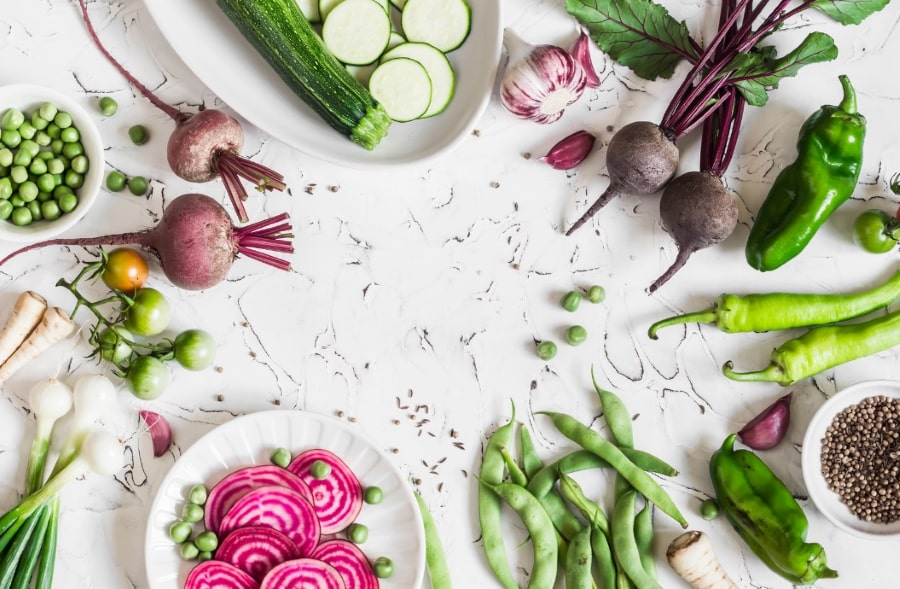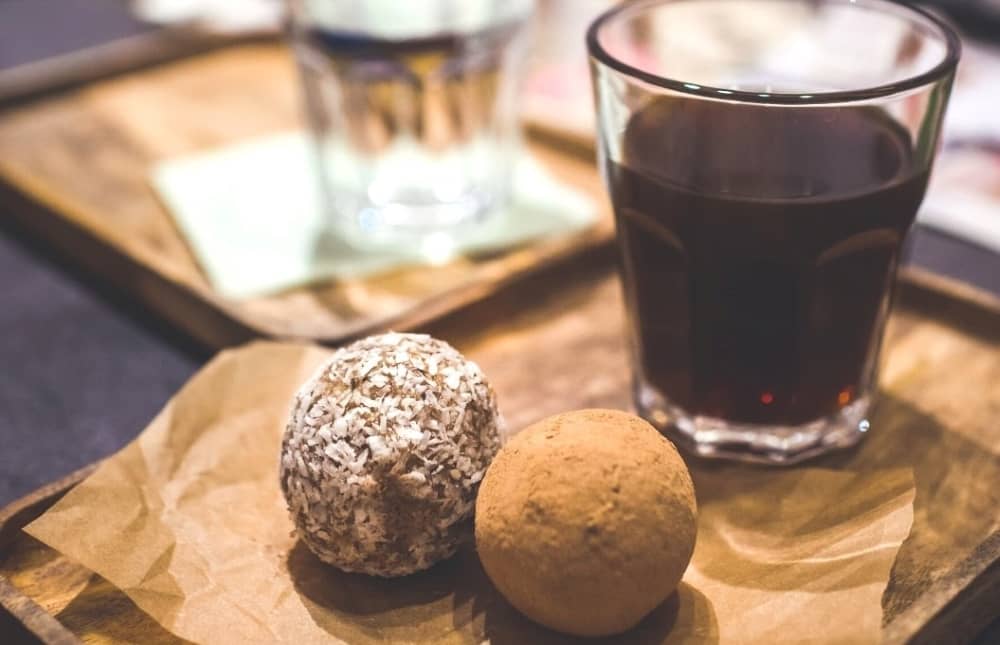

Join our usefulletter and get 10% off your first order + exclusive recipes, offers and BTS
A Guide to the Best Natural Sweeteners and How to Use Them
We wholeheartedly believe in having a sweet treat, I could even go as far as to say that sweet treats make the world a better place. But if you are trying to focus on natural sweeteners instead of processed sweeteners, we’ve got you covered.
Various alternative sweeteners are delicious, vegan, and easy to incorporate into a whole foods lifestyle. We’ve put together a complete guide to natural sweeteners, including their benefits and tips on using them, to help you choose the best natural sugar substitutes.
What Is the Difference Between Natural and Refined Sugar?
Although refined sugars are initially sourced from plants, such as corn, sugar beets, or sugar cane, their nutrients are removed during the manufacturing process.
Alternatively, natural sweeteners are made with minimal processing, preserving beneficial nutrients, vitamins, enzymes, and minerals.
The Best Natural Sweeteners
Here are some natural sweeteners to try if you are looking to cut down on your consumption of refined sugars. We’ve broken these natural sweeteners into two categories: dry and liquid.
*Note* When substituting alternative sweeteners for refined sweeteners, it may take some experimentation to find the proper ratios. While we’ve included some general guidelines on how to replace refined sugar with natural sweeteners, recipes may need to be tweaked according to the other ingredients used and your taste preferences.
In recipes, it is easiest to replace refined liquid sweeteners with an alternative natural liquid sweetener for best performance. Similarly, replace dry sugars with dry natural sweeteners.
Dry Sweeteners
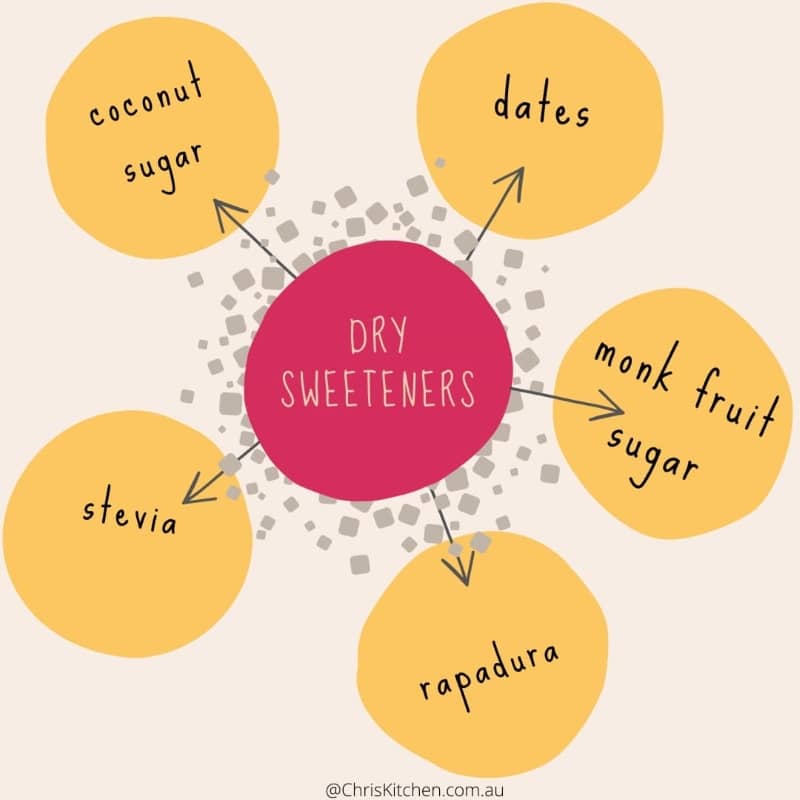
1. Coconut Sugar
Coconut sugar is a delicious natural sweetener made by extracting and dehydrating the sap from the coconut palm. Because it is processed at very low temperatures, it retains the majority of its nutrients. It is also considered one of the most sustainable sweeteners available as it produces more per acre, while also using fewer resources.
Nutrients and Health Benefits
- Low on the glycemic index
- Rich in minerals
- Contains 17 amino acids, Vitamin C, and B Vitamins
- Minimally processed
- Vegan
Flavour – Light caramel and toffee flavour
How to Use – Coconut Sugar can be substituted 1:1 with granulated sugar in baking. With its light caramel flavour, it is an especially great substitute for brown sugar. It’s a delicious addition to coffee, tea, and a variety of recipes.
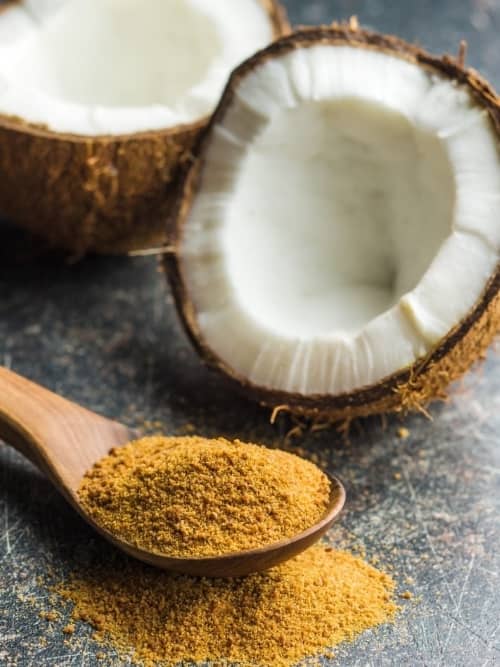
2. Dates
With their high content of vitamins and minerals and delicious taste, dates are arguably the perfect whole food sweetener. Since dates are dried fruit, they are suitable for raw vegan diets and add a rich sweetness to baked goods, raw treats, and smoothies.
Nutrient and Health Benefits
- Rich in fibre
- Contains potassium, iron, and magnesium
- Packed with antioxidants
- Vegan
- Perfect whole food sweetener for raw diets
Flavour – Indulgent caramel taste and chewy texture
How to Use – Dates can be used as a 1:1 replacement for refined sweeteners (they are especially excellent as a brown sugar replacement). They can be added to a food processor with your choice of nuts, seeds, dark chocolate, and shredded coconut to make nutrient-dense, easy raw energy balls.
You can also toss a few pitted dates into a smoothie or homemade non-dairy milk to add a hint of sweetness. When working with the smaller Iranian type of dates, it is often easier to soak them first (and always double-check for pits).
Here are a couple of our favourite recipes featuring dates as a natural sweetener: Caramel Cashew Chocolate Balls and Walnut and Sticky Date Bliss Balls.

3. Monk Fruit Sugar
Monk fruit sweetener is an excellent natural sweetener that is 100 times sweeter than sugar but without any calories.
Nutrients and Health Benefits
- No calories
- Contains some vitamin C
- Zero carbs
- Vegan
- Does not impact blood sugar levels
Flavour – As with stevia (below), monk fruit sweetener is over a hundred times sweeter than sugar
How to Use – You may want to start with less considering how sweet it is but it makes an excellent substitute for refined sugar. Monk fruit does have its unique flavour profile and I find it pairs best with soft dessert flavours such as vanilla and citrus.
4. Stevia
Stevia is made from the finely ground leaf of the Stevia Rebaudianna plant. Far sweeter than regular sugar, a little pinch of Stevia can go a long way. Be careful when adding Stevia to recipes (you can always add more if needed).
Nutrients and Health Benefits
- Calorie-free
- Does not affect blood sugar levels
- Zero glycemic index
- No carbohydrates
- Vegan-friendly
Flavour – Extremely sweet (approximately 150 times sweeter than sugar), some individuals may find that certain brands have a slightly metallic, bitter aftertaste
How to Use – For every 1 cup of dry sugar, substitute 1 tsp of stevia

5. Rapadura Sugar
If you are looking for the closest replacement to regular white sugar, Rapadura sugar might be your best option. It is made by dehydrating sugar cane juice without removing the molasses. While it contains roughly the same calories as regular sugar, it has a higher content of vitamins and minerals due to minimal processing.
Nutrients and Health Benefits
- Better nutrient content than plain white sugar
- The best natural sweetener option compared to refined white sugar
- It may contain several types of antioxidants, including phenolic compounds and flavonoids
- Contains minerals such as potassium, magnesium, calcium, and iron
- Vegan
Flavour – Because of its high molasses content, Rapadura sugar has a caramel colour and flavour
How to Use – Rapadura Sugar can be used as a 1:1 replacement for refined sugar in baking
Natural Liquid Sweeteners
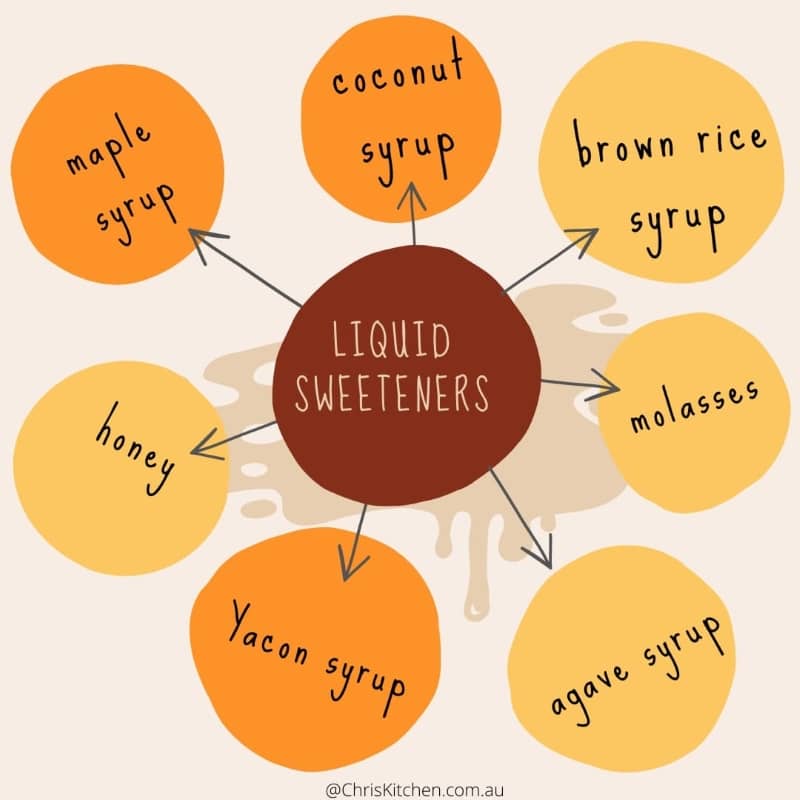
1. Maple Syrup
This versatile sweetener isn’t just an awesome pancake topping. Pure maple syrup, produced by boiling down sap from maple trees, is naturally sweet and high in a variety of beneficial nutrients.
Nutrients and Health Benefits
- Vegan
- Contains a variety of antioxidants
- Contains vitamins and minerals such as zinc, B vitamins, copper, calcium, potassium, and manganese
- Possesses antimicrobial properties
Flavour – Depending on the colour and grade of the maple syrup, its flavour ranges from mild and neutral to richer, deeper, and nuttier.
How to Use – Maple Syrup can be used as a 1:1 replacement for refined liquid sweeteners. It serves as a delicious substitute for refined sweeteners in baked goods, savoury dishes, and sauces.
These Almond White Chocolate Hearts are one of our favourite maple syrup recipes.
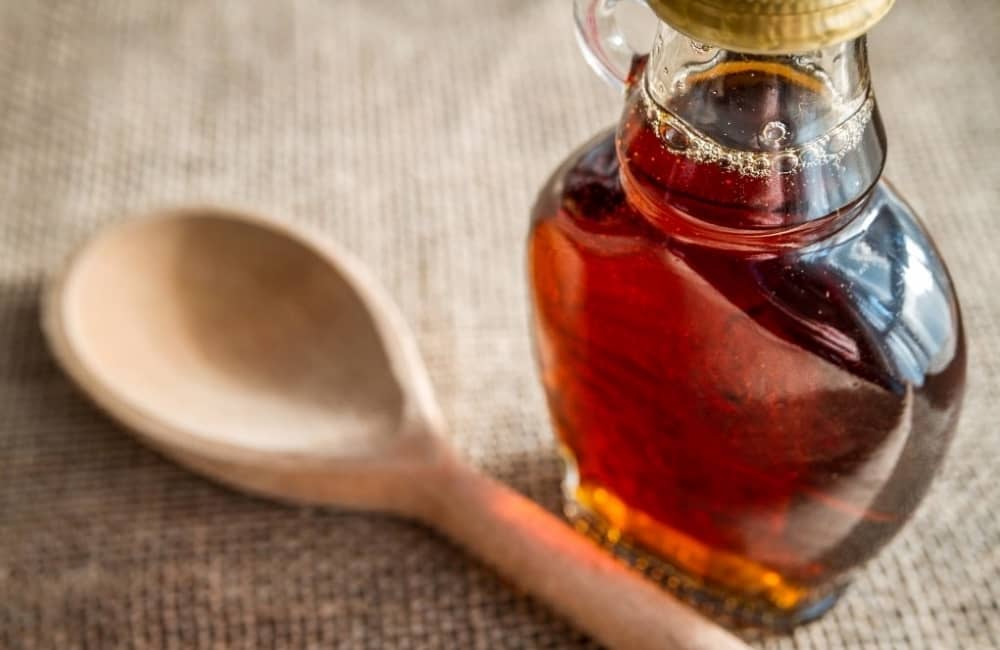
2. Coconut Syrup
This tasty syrup is produced from the gently heated sap of coconut palm flowers. While it may be surprising, it doesn’t taste like coconuts. It makes a delicious syrup over pancakes, waffles, or oatmeal and can be used as a versatile natural sweetener in baking or cooking.
Nutrients and Health Benefits
- Low on the glycemic index
- Contains amino acids
- Contains B vitamins, mienrals, and Vitamin C
- Vegan
Flavour – A unique combination of molasses and maple syrup, earthy, light caramel flavour, slightly sweeter than regular sugar, with a subtle tangy afternote
How to Use – Can be used 1:1 in place of refined liquid sweeteners
3. Brown Rice Syrup
Brown rice syrup is produced from brown rice and offers a versatile alternative to refined sugar. It does not contain fructose, making it a popular natural sweetener for individuals who need to limit fructose consumption (low FODMAP diet).
Nutrients and Health Benefits
- Free of fructose
- Contains small amounts of some minerals
- Vegan
Flavour – Amber coloured, light flavour, slightly nutty with butterscotch undertones
How to Use – Brown rice syrup can generally be used as a 1:1 replacement for refined liquid sweeteners in recipes.
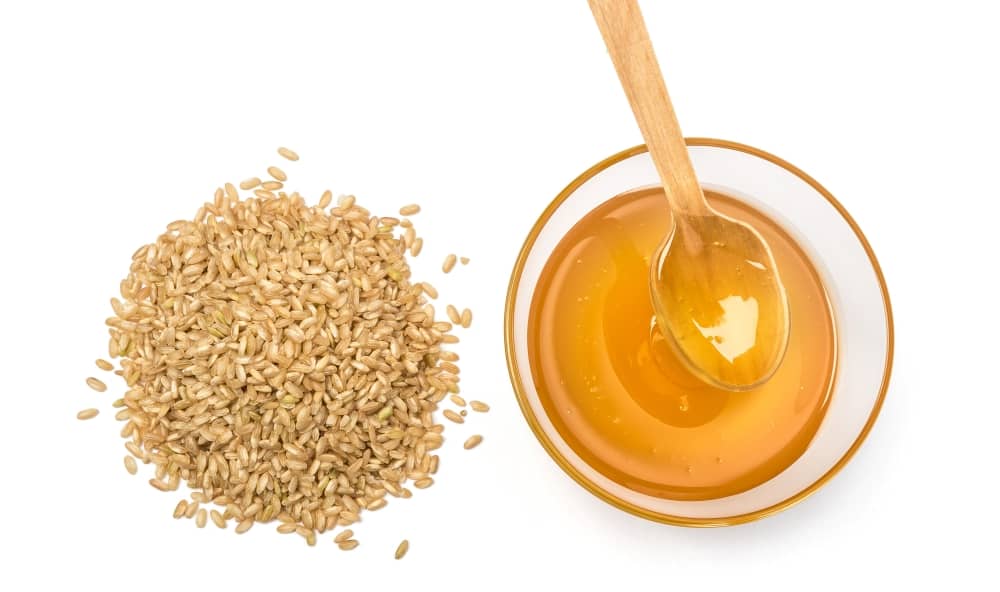
4. Molasses
Blackstrap Molasses is a popular natural sweetener and flavour enhancer used in bread, sauces, and marinades. Molasses results from the process of refining sugar beets or sugarcane into sugar.
Nutrients and Health Benefits
- Packed with iron, calcium, selenium, Vitamin B6, and copper
- Typically vegan-friendly
- Rich in inositol, a type of carbohydrate that provides structure to cells
Flavour – Strong, rich, robust flavour and thick texture, dark caramel colour
How to Use – With its prominent flavour, you may want to try adding a bit fewer molasses when using it as a replacement for refined liquid sweeteners (start by adding ½ the amount of liquid sweetener required and using another natural sweetener for the remaining amount)
5. Agave Syrup
Derived from Mexico’s Blue Agave cactus plant, Agave syrup is a versatile natural sweetener that can be used in cooking, baking, smoothies, and vegan desserts. It is naturally sweeter than sugar but does contain a high content of fructose.
Nutrients and Health Benefits
- Low glycemic
- Rich in vitamins and minerals
- Source of inulin (a prebiotic)
- 100% vegan
Flavour – Similar in taste to honey and maple syrup, far sweeter than sugar
How to Use – In general, use ⅔ cup to ¾ cup agave for every 1 cup of liquid sweetener
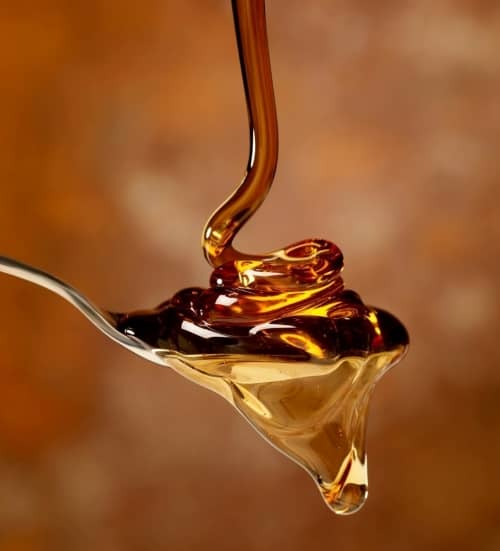
6. Yacon Syrup
Yacon syrup is derived by extracting juice from the roots of the yacon plant. The juice is then filtered and evaporated in a process that is similar to how maple syrup is produced.
Nutrients and Health Benefits
- Rich in antioxidants
- Contains inulin, a sugar that gets broken down into fructooligosaccharides (FOS), prebiotics that support the growth of beneficial bacteria in the gut
- Glucose free
- Contains 20 essential amino acids
- High in calcium, magnesium, phosphorous, iron, and potassium
- Vegan
Flavour – Similar taste to molasses or caramel, a similar texture to molasses
How to Use – For every 1 cup of refined liquid sweetener, replace it with ⅔ cup of yacon syrup
7. Honey
Honey is one of the most popular natural sweeteners. When consumed raw, it is a source of nutrients and enzymes. It makes a great substitute for refined liquid sweeteners when used in marinades, baking, and sauces.
Nutrients and Health Benefits
- Contains a variety of vitamins and minerals, including iron, calcium, Vitamin B6, magnesium, and more
- Contains enzymes and amino acids
- Possesses antibacterial and antimicrobial properties
- Suitable for raw diets (look for honey that is labelled raw, indicating that it has been processed at low temperatures)
Flavour – Honey varies in flavour based on where it is harvested, which flowers the bees pollinate, and the season. It can be floral, woody, fruity, and contain a variety of unique flavour characteristics.
How to Use – Use as a 1:1 replacement for refined liquid sweeteners. Honey can be used for naturally sweetening tea or smoothies. It is also often served drizzled over oatmeal or yoghurt.

Tips When Choosing a Natural Sugar Substitute
As with any ingredient or food, it is important to double-check the nutrition label. While a product labelled “maple flavoured syrup” or “sugar-free” may sound healthy, these products can be loaded with unhealthy sweeteners, additives, preservatives and artificial ingredients.
When wondering which sweeteners to choose, try to opt for products that feature 100% natural, wholefood ingredients without any unnecessary fillers or additives.
Looking for More Healthy Treats?
If you are interested in adding more nutrient-dense, whole foods to your lifestyle, we offer a wide range of sweet treats that make it easy to eat a healthy, plant-based diet.
We also regularly update our blog with health tips, vegan and gluten-free recipes, raw dessert recipes, and plant-based lifestyle tips.
For more recipes that use natural sweeteners such as dates and maple syrup, check out our collection of vegan recipes.

